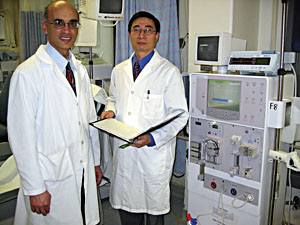 | Dr. Gary Desir (left) and Dr. Jianchao Xu say that their research on a kidney protein may lead to new treatments for victims of heart attacks. |
Researchers at the School of Medicine and the VA Connecticut Healthcare System in West Haven identified a novel human kidney protein called renalase that regulates both heart contraction and blood pressure, and that is a strong candidate for easily administered treatment of advanced kidney and cardiovascular disease.
Over eight million people in the United States have kidney impairment, and 500,000 have end-stage renal disease (ESRD), for which treatment is often limited to dialysis. Elevated blood pressure and cardiovascular disease are commonly associated problems.
Renalase is secreted by the kidneys and circulates freely in the bloodstream. Patients with kidney disease have very low levels of renalase, suggesting that its absence may lead to the cardiovascular complications found in ESRD.
"This is one of the most exciting findings of kidney metabolism in recent years," says Dr. Jianchao Xu, associate research scientist in the Department of Internal Medicine (Nephrology), attending physician at Yale-New Haven Hospital and lead author. "It has immediate implications for therapy."
Like erythropoietin, the human renalase protein could be injected to replace what is lost in kidney disease, explains Xu.
While the kidneys remove waste and extra water from the body and control the balance of certain chemicals in the blood -- such as sodium, phosphorus and potassium -- by regulating the body water volume, they also have another function. They secrete hormones, like renin and erythropoietin, into the blood to regulate blood pressure and red cell production.
Xu along with Dr. Gary V. Desir, professor in the Department of Medicine (Nephrology) and senior author, screened genetic databases for other hormones produced by the kidney that regulate the cardiovascular system. They discovered renalase, a monoamine oxidase that breaks down catecholamines, such as adrenaline and dopamine.
Desir notes, "We are hopeful that renalase will impact the treatment of chronic kidney disease as favorably as erythropoietin, and change the way in which we treat patients with chest pain and heart attacks."
Other authors include Guoyong Li, Dr. Peili Wang, Heino Velazquez, Dr. Yan Yan Li, Dr. Yanling Wu, Dr. Aldo Peixoto and Dr. Susan Crowley from Yale and the VA center, and Xiaoqiang Yao from the Chinese University of Hong Kong. Funding was provided by the Veterans Administration and grants from the National Institutes of Health.
-- By Janet Rettig Emanuel
T H I S
Researchers identify a protein in the kidney that regulates heart function and blood pressure W E E K ' S
W E E K ' S S T O R I E S
S T O R I E S![]()
 Team uses lasers to control specially modified fruit flies
Team uses lasers to control specially modified fruit flies![]()
![]()
 Financial aid increased for Ph.D. students
Financial aid increased for Ph.D. students![]()
![]()
 Exhibits recount Yale's history and the contributions of its alumni
Exhibits recount Yale's history and the contributions of its alumni![]()
 Visitor Center enjoys pride-of-place as it showcases Yale
Visitor Center enjoys pride-of-place as it showcases Yale![]()
 Event will bring together staff, students to help city groups
Event will bring together staff, students to help city groups![]()
![]()
 Kim Bottomly has been named as a deputy provost . . .
Kim Bottomly has been named as a deputy provost . . .![]()
![]()
 Zedillo appointed envoy to U.N.'s summer summit
Zedillo appointed envoy to U.N.'s summer summit![]()
![]()
 Yale undergraduates make impressive showing in . . .
Yale undergraduates make impressive showing in . . .![]()
![]()
 Cycle of August Wilson plays to conclude with 'Radio Golf'
Cycle of August Wilson plays to conclude with 'Radio Golf'![]()
 Next Yale Rep season features new plays . . .
Next Yale Rep season features new plays . . .![]()
 Monthly injections of naltrexone in combination with therapy . . .
Monthly injections of naltrexone in combination with therapy . . .![]()
![]()
 Researchers identify a protein in the kidney that regulates . . .
Researchers identify a protein in the kidney that regulates . . .![]()
![]()
 Conference pays tribute to ethicist Margaret Farley
Conference pays tribute to ethicist Margaret Farley![]()
![]()
 Panel and exhibit mark 30th anniversary of fall of Saigon
Panel and exhibit mark 30th anniversary of fall of Saigon![]()
![]()
 Event honors individuals who have contributed to women's health
Event honors individuals who have contributed to women's health![]()
![]()
 Conference will consider future of controversial Voting Rights Act
Conference will consider future of controversial Voting Rights Act![]()
![]()
 Culture and community
Culture and community![]()
![]()
 Event highlights new research on AIDS
Event highlights new research on AIDS![]()
![]()
 YALE CANCER CENTER NEWS
YALE CANCER CENTER NEWS World-renowned researcher Foss to join staff
World-renowned researcher Foss to join staff![]()
 Student's internship earns her accolades in Westinghouse contest
Student's internship earns her accolades in Westinghouse contest![]()
![]()
 Gender studies is topic of final talk in year-long series
Gender studies is topic of final talk in year-long series![]()
![]()
 In Memoriam: Jack S. Greenberg
In Memoriam: Jack S. Greenberg![]()
![]()
 Journal addresses SARS and other health issues in China
Journal addresses SARS and other health issues in China![]()
![]()
 Calvin Hill opens new art studio
Calvin Hill opens new art studio![]()
![]()
 Campus Notes
Campus Notes![]()
![]()
 Golden Girl
Golden Girl![]()
Bulletin Home |
| Visiting on Campus
Visiting on Campus |
| Calendar of Events
Calendar of Events |
| In the News
In the News![]()
Bulletin Board |
| Classified Ads
Classified Ads |
| Search Archives
Search Archives |
| Deadlines
Deadlines![]()
Bulletin Staff |
| Public Affairs
Public Affairs |
| News Releases
News Releases |
| E-Mail Us
E-Mail Us |
| Yale Home
Yale Home